Diversity
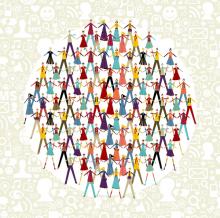
When Frederick Douglas assembled with other representatives at the National Colored Convention of 1853, they collectively condemned the nationwide epidemic of racial discrimination. As the gathering intended to discuss the circumstances and possibilities of “coloreds” (as they were called then), they recognized the various ways that “scorn and contempt” were heaped upon them — for no justifiable reason — by the white-skinned racial majority.
In remembrance of Douglas’ critique surrounding his 19th century “white countrymen,” and in recognition of our annual celebration of Black History Month, we in the U.S. continue to mourn the deep divisions that occur due to racial misunderstanding. In other words, as we take an inventory of race relations roughly 195 years after Frederick Douglas was born, we recognize that racial ignorance among far too many of our citizens continues to result in a disturbing level of collective indifference and social inequality.
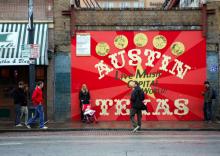
AUSTIN, Texas — After a walk around the Texas Statehouse, it became clear they tell a different history here.
Inside the Capitol is a large painting of a onetime Tennessee congressman named David Crockett, who failed in a re-election bid and stormed out west to join the revolution in what was then called Tejas. He arrived in 1836 and died four weeks later at the Alamo in San Antonio.
A plaque beneath the oversized painting suggests Crockett was a laborer who became larger than life when he got to Texas. A more balanced account suggests Crockett had been building his legend for many years, with exotic garb, a self-published autobiography, and fiery speeches against President Andrew Jackson. He yearned to star in Washington, and when that failed, he went west, landing at the Alamo just in time to die there.
An ambitious state needs its mythology.
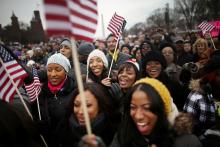
"Faith in America's Future" — that was the theme of Monday's inauguration activities.
Watching the prayers, the songs, the speeches, the crowd massed on the Washington Mall, I felt the faith. We don't have to hate each other. We can work together for a future that will be good for our country and for us as individuals. We can, as the President charged us to do, make the "values of life and liberty and the pursuit of happiness real for every American."
Inaugurations are times for setting aside differences and wildly celebrating. While Richard Blanco read his inaugural poem, even John Boehner looked teary-eyed.
The political divisions will be back in full force this week, of course. And yet we Americans are in the midst of some really big changes — changes that may make today's partisan squabbles look hopelessly antiquated in just a decade or two. Monday's events highlighted these changes.
Editor's Note: This column is part of a duo of posts commenting on racial reconciliation in light of Martin Luther King, Jr. Day. Read the accompanying piece, "A Convenient Truth: I Am White."
I am black in the United States of America. It is quite inconvenient to be black in the United States of America. It has always been inconvenient to be black in the United States of America.
My African ancestors were brought to the United States in chains against their will, taken straight to the plantations, and forced into slavery. They did not pass through Ellis Island, as did most of the ancestors of my white counterparts. My ancestors who fought in two world wars were not allowed any advantages of the GI Bill, schooling, the trade unions, or the opportunities of corporate America that white veterans had; therefore, as a black baby I am more likely to be born into a family who is mired in systemic poverty than a baby who is white.
I am much more likely to live in an impoverished neighborhood, receive an inferior education in a neighborhood school, and not graduate from high school than white students my age. Those are inconvenient truths.

Editor's Note: This column is part of a duo of posts commenting on racial reconciliation in light of Martin Luther King, Jr. Day. Read the accompanying piece, "An Inconvenient Truth: I Am Black."
I am white. It is quite convenient to be white. In fact, it has always been convenient to be white in the United States of America.
According to the U.S. Census Bureau, I am more likely to be employed than someone who is not white, I am less likely to be incarcerated, I am more likely to be covered by health insurance, and I am more likely to enjoy a comfortable retirement and eventually die peacefully in my elder years. I am more likely have a college education than a non-white person, my (white) wife is more likely to receive excellent medical care, my (white) children are more likely to attend private schools with skilled teachers, and my (white) family is more likely to have a roof over our heads, a few cars in the garage, and more than enough food on our table.
While individual cases vary, to be white is – generally speaking – a convenient truth.
There are countless factors one could cite for the current levels of race-based inequality in the U.S., and many opinions exist surrounding potential solutions, yet there are three points of emphasis that need to be addressed for the advancement of racial reconciliation.

SALT LAKE CITY—The Church of Jesus Christ of Latter-day Saints isn't changing its tune about homosexuality, but it has launched a new website to alter the tone.
The site — unveiled on Dec. 6 and called “Love One Another: A Discussion on Same-Sex Attraction” — includes video clips of Mormon leaders as well as gay members and their families promoting compassion and understanding toward homosexuals, and encouraging everyone to be “disciples of Christ.”
“Our hope with this site is that empathy will grow in families,” LDS apostle D. Todd Christofferson says in one clip. “We’re trying to communicate that our love is inclusive, that we want to have the family remain intact, and the relationships we’ve treasured over the years to remain and to grow.”
It’s important, the apostle says, “to recognize the feelings of a person, that they are real, that they are authentic, that we don’t deny that someone feels a certain way.”
Many gay rights activists, inside and outside the LDS church, applaud Mormonism’s latest effort.
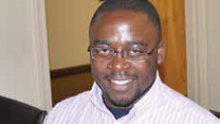
Bio: Executive Director, Padare/Enkundleni Men's Forum on Gender in Harare, Zimbabwe — www.padare.org.zw
1. How are women working for gender equality in Zimbabwe? We have a very strong women’s movement in Zimbabwe. We have the Women and AIDS Support Network. We have the Campaign for Female Education, an organization doing wonderful work giving grants to girls so that they stay in school. We have another organization that deals with violence against women; there are no government-provided shelters for battered women in Zimbabwe. There are organizations for young women, for women in rural communities—I could go on and on.
2. “Padare” and “Enkundleni” mean “meeting place” in Zimbabwe’s Shona and Ndebele languages. What does Padare work to do? We are not bringing a new agenda to the table; we are saying, let’s look at all of these women’s organizations and the issues they’re bringing—violence against women, access to education, access to reproductive health, HIV and AIDS. What can men do? Perpetrators of violence against women are men. Men can make a personal commitment of not being violent against their partners. That’s a political statement, but from a very personal perspective. So the feminist slogan that “the personal is political” is equally applicable to men.

A YOUNG MAN of American Indian heritage said to me: "Imagine growing up an American Indian halfbreed with the blood of Caddo, Choctaw, and Chickasaw tribes in you ... Imagine growing up ... knowing that you belong to a culture long native to this land before the white man 'discovered' it. Imagine trying to assert your identity when the majority of society affirms that 'Indians are a dead race.'" ...
With words of dismissal, the politicians wipe out the tribes' meaning and deface them of their honor. With words, they strip American Indians of race, culture, philosophy, reason. With words they cover the Indians with a gloss of alienation and meaninglessness, leaving them hollowed-out entities, repeating over and over the rules of a society that was never their own.
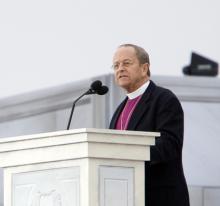
CONCORD, N.H. -- When V. Gene Robinson became the first openly gay bishop in the Episcopal Church in 2003, his controversial election triggered shock waves and fears of schism across the worldwide Anglican Communion. Hundreds of parishes left the Episcopal Church in protest.
Now, as this lighting-rod figure prepares to retire on Jan. 5, he’s leaving New Hampshire for a city that knows polarization all too well: Washington, D.C.
But rather than throw fuel on the culture wars, Robinson foresees a new role as a bridge builder for a nation strained by divisive issues. First up: helping his new church home, St. Thomas’ Parish in Dupont Circle, found a Center for Non-Violent Communication.
“Our big goal is to change the nature of the debate in Washington,” Robinson said during an interview at his Concord office. “We’re mostly shouting at each other these days. We’d like (the center) to become a place where people can learn about and commit themselves to a different kind of tone.”

The first part of 2012 was rough for the ladies. Exhibit A. Exhibit B. Exhibit C.
Any response? Any backlash? Oh right, the election. In the 113th Congress, there will be 20 women in the Senate. When I was a teenager, I read Nine and Counting: The Women of the Senate. That book is obsolete, and it makes me so happy. Though, I hate that we have to count how many women are in leadership (go to 2:35), we are making strides. It should just be so ingrained in our minds that we shouldn’t have to describe them as “the third woman CEO,” but just “CEO.”
In 2013, the entire congressional delegation from New Hampshire will be women. Their governor will be a woman. It’s awesome. So maybe the last quarter of 2012 (and beyond) will be a glorious time to be a woman. But what does the last quarter of the year really mean? CHRISTMAS!!
Last year, I wrote a blog post called, “The Top 10 Worst Toys to Give Your Daughter This Christmas.” Not to brag or anything, but it was pretty awesome (in the worst way possible). But you know what? It’s time to give a shout out to the toys that are positive for girls. Let’s lift up some good examples. Let’s never be surprised that a girl says “I want to be an astronaut” or “I want to be president.” And that dream can start with a toy. But let’s face it, it’s hard to find toys that are geared towards girls without stereotyping, or just a boy’s toy that’s painted pink.
So, here it is — the Top 10 Gifts You Should Get Your Daughter This Christmas.

Three Buddhists, a Hindu, and a “none” will walk into the 113th Congress, and it’s no joke. Rather, it’s a series of “firsts” that reflect the growing religious diversity of the country.
When the new Congress is sworn in next January, Hawaii Democrat Tulsi Gabbard, an Iraq war veteran, will represent the state’s 2nd Congressional District and will become the first Hindu in either chamber on Capitol Hill.
The 31-year-old Gabbard was born in American Samoa to a Catholic father and a Hindu mother, and moved to Hawaii as a child. She follows the Vaishnava branch of Hinduism, which venerates the deity Lord Vishnu and his primary incarnations.
Gabbard takes over the seat held by Rep. Mazie K. Hirono, who won a Senate race on Nov. 6 and will become the first Buddhist to sit in the upper chamber. There were already two other Buddhists in the House of Representatives, both of whom won re-election: Rep. Hank Johnson, a Georgia Democrat, and Rep. Colleen Hanabusa, a fellow Hawaii Democrat.
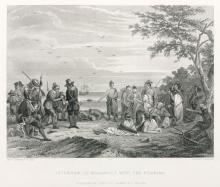
"The antidote to feel-good history is not feel-bad history but honest and inclusive history." – James Loewen, Lies My Teacher Told Me, 92.
It’s becoming increasingly difficult for Americans to celebrate Thanksgiving. This Thanksgiving, as we take turns around the dinner table sharing why we are thankful, a sense of awkwardness settles in. The awkwardness is not only due to the “forced family fun” of having to quickly think of something profound to be thankful for. (Oh, the pressure!) The growing awkwardness surrounding Thanksgiving stems from the fact that we know that at the table with us are the shadows of victims waiting to be heard.
Humans have an unfortunate characteristic – we don’t want to hear the voice of our victims. We don’t want to see the pain we’ve caused, so we silence the voice of our victims. The anthropologist Rene Girard calls this silencing myth. Myth comes from the Greek worth mythos. The root word, my, means “to close” or “to keep secret.” The American ritual of Thanksgiving has been based on a myth that closes the mouths of Native Americans and keeps their suffering a secret.
Christian Post reports:
When the new members of Congress are sworn in on Jan. 3, the institution that once mirrored the nation's Protestant Christian dominance will look slightly more like the religiously diverse nation it represents. The new Senate will seat a Buddhist member for the first time and the House of Representatives will have its first Hindu member.
Rep. Mazie Hirono (D-Hawaii), who currently serves in the House of Representatives, won her Senate race last week and will be sworn in as the Senate's first Buddhist. Hirono's House seat will be filled by Tulsi Gabbard, who will become the first Hindu in Congress. Hirono will also be the first Asian-American female and the first person born in Japan to be elected to the U.S. Senate.
Read more here.

Anti-Semitic incidents in the U.S. dropped by 13 percent in 2011, according to a report released Nov. 1 by the Anti-Defamation League, which tracks assaults and other attacks on Jews.
There were 1,080 incidents against Jews last year, according to the ADL, the lowest tallied by the non-profit civil rights group in two decades.
“It is encouraging that over the past five or six years we have seen a consistent decline in the number of anti-Semitic incidents across the country and that the numbers are now at a historic low,” said Abraham H. Foxman, ADL's national director.

AS I WRITE this, the top story on The New York Times website reads “Anti-American Protests Over Film Expand to More than a Dozen Countries.” The slideshow includes images of angry young men with their fists in the air and masks over their faces protesting on dusty streets filled with riot police and open fires. As if Americans’ view of Muslims was not dark enough.
The film in question is the 14-minute YouTube clip called Innocence of Muslims that portrays the Prophet Muhammad as a buffoonish clown and even a child molester. It was created and promoted by individuals with a long history of anti-Muslim activities, who were perfectly aware that it would provoke a small segment of Muslims around the world to violence. And it is now that violent response that is defining the Muslim world to many people—just as in the case of the attacks of 9/11 and the riots provoked by the Danish cartoons in 2005. As @TheBigPharoah said on Twitter: “The sad thing is that those who attack embassies are like hundreds, barely a thousand. Millions are tarnished by what they do though.”
It is impossible to overstate how frustrating it is to be constantly represented by violent thugs and to be asked to explain their actions. Here is the question one African-American seminary student I recently met asked me over email: “Why do so many Muslims ... become so enraged when someone from the West deliberately breaks an Islamic rule they take as offensive?”

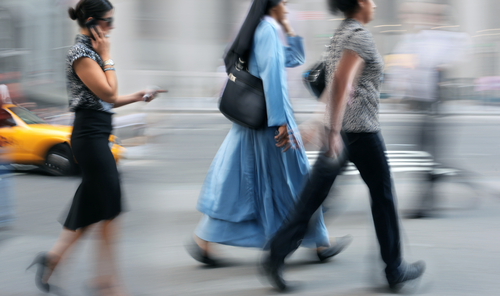
Editor's Note: Alyssa Bain tells her story of why she's part of the 20 percent of Americans who identify with "no religion in particular." Find more stories (or share your own) HERE. Read about the study HERE.
Last weekend I watched Sister Act (both of them, actually) with some friends (who also happen to be nuns)
I am not a nun. I am not a novice. I am not Catholic. Some days I wonder if I am even Christian.
According to a recent study by the Pew Forum, I actually just might be a “none.”
The research is out, and it seems that my generation is stumping the world as the generation that, for whatever reason, refuses to label itself.
Personally, I’ve been having trouble with labeling myself for quite some time. Lutheran. Non-denominational. Methodist. Universalist. Evangelical. Protestant.
But none of them quite fit right. The problem with labels is that there are always exceptions. Nothing is black and white. The label “none” lumps together atheists, agnostics, and, well, me. I am not an atheist. I might be kind of agnostic, but there really is just something about that Jesus guy.
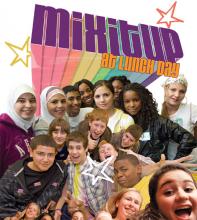
One of my current writing projects has me spending a lot of time in the Gospels, especially the Gospel according to Luke, which may be my favorite Gospel (are we allowed to have favorites?) not least because of its astonishing reversals:
It's the Gospel where a poor, uneducated girl — Mary — has more faith than an educated, aged, male priest--Zechariah.
It's the Gospel where a widow's two pennies amounts to more in God's eyes than fat donations from wealthy pockets.
It's the Gospel where Jesus says: “When you give a banquet, invite the poor, the crippled, the lame, the blind." Invite the people who can't pay you back, because that is the where the real reward is.
Yes, Luke's Gospel is a Gospel that proclaims love for the marginalized. And out of the four, Luke has the most meals.
(It's the Gospel in which Jesus is accused, among other things, of being a "glutton and a drunkard," who eats with "tax collectors and 'sinners.'")
In other words, it's the Gospel that Mixes It Up At Lunch.
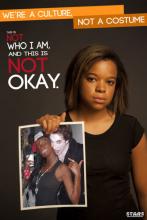
Americans love Halloween. In fact, maybe it’s fair to say we go crazy about Halloween. How crazy?
Americans spend $310 million dollars per year on costumes … for our pets. Wow.
In total, Americans spend between $6.5 – $6.86 billion dollars on all things Halloween: costumes, candy, and decoration. More wowzers.
So, as the average consumers spends about $27 on costumes, I thought it’s never too early to encourage folks to be careful how they dress up for Halloween … even if it’s “all in the spirit of fun.”
Listen, I like fun. And while my social life is nearly zilch, I like fun parties, but it’s all fun and games until someone shows up at a costume party or … err … at your front door trick-or-treating in a borderline racist costume.
Yes, it’s not too early to tell people:
Please don’t dress up in a blackface, yellowface, brownface, or any other costumers that stereotype, denigrate, or mock another culture.
Don’t caricature another real culture. Why? Because we’re a culture and not a costume.

Growing up, I looked to my dad as the quintessential definition of what a man was. He was pretty quiet but prone to anger. He worked crazy hours as the primary provider in the house, but still made time to build things nearly every weekend around the house. He had tons of tools, knew everything about everything and was never, ever wrong.
Some of what he was to me was passed along; most of it didn’t stick. And for that, I was pretty sure there was something wrong with me. Maybe I was gay. Could be that I just missed out on some critical “male gene” that made me want to work with tools and amass an encyclopedic knowledge about sports. I mean, I liked baking with my nana, and when I stayed over at their house for the weekend, sometimes I’d even paint my nails with her polish. I also went golfing and fishing with granddad, but I’d rather draw or play music than help my dad rebuild the retaining wall around the porch.
Must be something wrong with me.

BAHIR DAR, Ethiopia — When I posted this photograph of a beautiful little Ethiopian girl holding a daisy a few days ago, my friend and fellow God's Politics blogger Christian Piatt responded on Twitter with a four-word comment:
"The Face of God."
Christian's remark stopped me in my tracks ... because it's absolutely true.